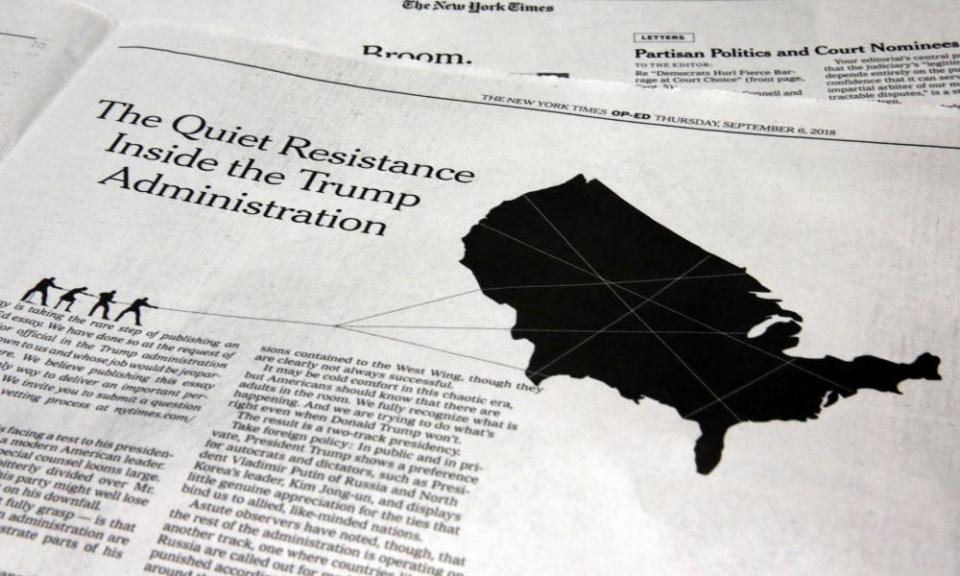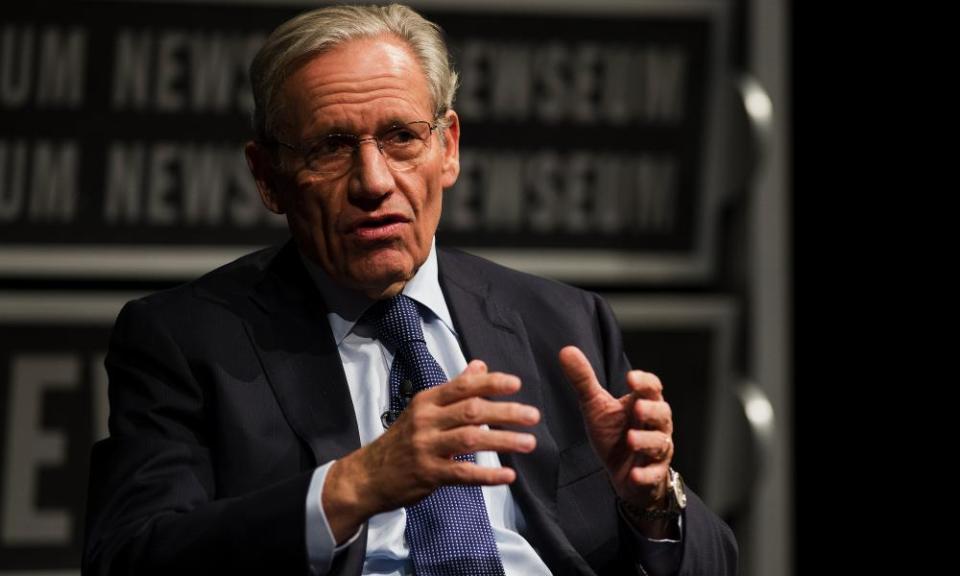Op-ed sparks high-stakes whodunit in Washington as Trump rages
Controversial New York Times essay raised questions about who is really in control in the White House

One by one, all the president’s men – and a handful of women – came forward. They did so to deny writing an extraordinary anonymous essay, published in the New York Times, that described a White House “resistance” to the worst impulses of the president: Donald Trump.
Vice-President Mike Pence said he was “above such amateur acts”. “Not mine,” said the secretary of state, Mike Pompeo. It would be “laughable”, said treasury secretary Steven Mnuchin, to think he wrote it. It would be “patently false” to say it came from Dan Coats, director of national intelligence.
Commerce secretary Wilbur Ross? “Thoroughly appalled.” Education secretary Betsy DeVos? She “signs her opinions”. Labor secretary Alexander Acosta? He “does not play these sophomoric Washington games”.
Trump tracked the denials, reportedly helped by aides who printed and hand-delivered the statements. By the end of Thursday, nearly every top official and cabinet member had publicly disclaimed the column, which was credited only to “a senior official in the Trump administration”.
It was all part of a high-stakes whodunit that is riveting Washington – and raising profound questions about who is really running the country.
“Many Trump appointees,” the anonymous author wrote, “have vowed to do what we can to preserve our democratic institutions while thwarting Mr Trump’s more misguided impulses until he is out of office”.
“The result is a two-track presidency.”
The depiction of a presidency in crisis was strikingly similar to that contained in a forthcoming book, Fear, by the veteran journalist Bob Woodward, whose dogged work with Carl Bernstein on Watergate led to the resignation of Richard Nixon. The Washington Post, for whom Woodward works, reported its contents. The Guardian also obtained a copy.
Trump called the book a “fraud” and suggested the author of the essay committed “treason”. On Friday, he told reporters aboard Air Force One the White House was running “beautifully” and claimed no previous president had accomplished what he has, “not even close”.
Woodward, however, writes that administration officials and staff are so alarmed by the president’s lack of judgement, leadership and sophistication that they take direct action to thwart his initiatives, setting in motion what the author calls an “administrative coup d’etat”.
In one story reported in Fear, defense secretary James Mattis ignores an order from Trump to assassinate the president of Syria, Bashar al-Assad, after his regime uses chemical weapons against civilians. In another episode, then economic adviser Gary Cohn removes from the president’s desk a letter that would formally withdraw the US from a vital trade agreement with South Korea. Cohn is reported to have done the same to stop Trump withdrawing from the North American Free Trade Agreement (Nafta), a pact he railed against as a candidate.
Of the anonymous op ed, meanwhile, George W Bush speechwriter David Frum said in the Atlantic: “The author … is hoping to vindicate the reputation of like-minded senior Trump staffers. But what the author has just done is throw the government of the United States into even more dangerous turmoil. He or she has enflamed the paranoia of the president and empowered the president’s willfulness.”
The headline on Frum’s piece: “This is a constitutional crisis.”
‘Nothing in this town stays secret forever’
In a White House where turnover is high and leaks are already pervasive, Trump is reportedly left unsure of who to trust. He is also nursing a well-documented fear, that a so-called “deep state” is working to override his authority.
After all, the anonymous official wrote: “Americans should know that there are adults in the room. We fully recognize what is happening. And we are trying to do what’s right even when Donald Trump won’t.”
The biggest issue they’re going to have is finding who wouldn’t have written a letter like that
Bob Corker
On Thursday, Trump duly lashed out on Twitter: “The Deep State and the Left, and their vehicle, the Fake News Media, are going Crazy – & they don’t know what to do.”
According to the Washington Post, the president is “hellbent” on finding his betrayer. On Friday, he called on the attorney general, Jeff Sessions, to launch an investigation. Outside the White House, meanwhile, everyone in Washington joined in the whodunnit, from the cashier at a local convenience store to the House minority leader.
“The vice-president – that was my first thought,” said Nancy Pelosi, unable to conceal a smile. “I guess by process of elimination it will come down to the butler.”
House speaker Paul Ryan said he didn’t know who wrote the article and did not see a role for Congress in trying to figure it out. But, he added wryly: “Nothing in this town stays secret forever, and so ultimately I do think we will find out who is the author.”
Some preferred a more aggressive approach. Rand Paul, a Kentucky senator and libertarian who is usually an advocate of privacy rights, suggested the White House subject employees to a lie detector test.
“If you have a security clearance in the White House, I think it would be acceptable to use a lie detector test and ask people whether they are talking to the media against the policy of the White House,” he said.
He or she is saying that those closest to the president of the United States believe he is unfit for the presidency
David Kusnet
Bob Corker of Tennessee, a Republican critic of Trump, said the concerns detailed in the op-ed shouldn’t be “news” to “anyone who has had any dealings” with the White House.
“This is the reality that we’re living in,” he said. “The biggest issue they’re going to have is finding who wouldn’t have written a letter like that.”
Amateur sleuths and professional language detectives pored over the text, in search of rhetorical clues. “Lodestar”, many noted, is an uncommon word that happens to be a part of the vice-president’s lexicon. Others argued it was a deliberate red herring. Either way, Merriam Webster reported that searches for its definition had spiked.
Other observers noted provocative moves by the author. He or she chose Trump’s home town paper, which the president still reads religiously despite repeatedly deriding it as “failing”, instead of the Washington Post. He or she also invoked the late senator John McCain, who refused to allow Trump to attend his funeral.
‘What’s important is to find out if this person is telling the truth’
David Kusnet, once a speechwriter for Bill Clinton, was first to reveal that the journalist Joe Klein was the anonymous author of the 1996 novel Primary Colors. He said the Times essay contained “the quirks of a speechwriter”. But, he added, this time the quest to unmask the author is not just a Washington “parlor game”.

“If you take the anonymous writer at face value, he or she is saying that those closest to the president of the United States believe he is unfit for the presidency,” Kusnet said. “They don’t trust him to run the country.
“What’s important is to find out if this person is telling the truth both about Trump and about the administration.”
The White House and Trump’s allies have fiercely attacked the Times, for its decision to publish the piece, and the author for writing it. But few have challenged its substance, which echoes reports by media outlets, former officials and authors.
White House press secretary Sarah Sanders simply demanded reporters “stop” asking about the identity of the “gutless loser” behind the op-ed. All questions should be directed to the Times opinion desk, she said, in a statement that included the phone number for the newspaper’s switchboard. The Times refused to provide any details.
On Thursday, a Wall Street Journal article from 1974 pinballed across Twitter. Its headline: “If you drink scotch, smoke & read, maybe you’re ‘Deep Throat’.”
The story ran just 10 days after Bernstein and Woodward published their devastating account of the Watergate scandal, All the President’s Men. It opened with a denial: “W Mark Felt says he isn’t now, nor has he ever been, Deep Throat.”
In fact, he was. But it took 31 years for the world to be told. To the social media skeptics, the story was a reminder that all this week’s denials, and all Trump’s fire and fury, brought Washington no closer to identifying #lodestar.

